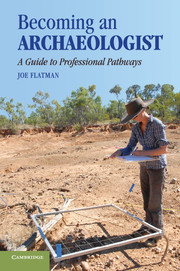Book contents
- Frontmatter
- Contents
- Tables and Figures
- Preface and Acknowledgments
- Introduction
- One What Is – and Isn't – Archaeology?
- Two Skills and Training
- Three Cultural Resource Management
- Four Academia
- Five Local Government
- Six Central Government
- Seven Public and Community Archaeology
- Conclusion
- Appendix 1 Useful Websites
- Appendix 2 Glossaries
- Appendix 3 Suggested Equipment to Take on an Archaeological Project
- References
- Index
Preface and Acknowledgments
Published online by Cambridge University Press: 05 June 2012
- Frontmatter
- Contents
- Tables and Figures
- Preface and Acknowledgments
- Introduction
- One What Is – and Isn't – Archaeology?
- Two Skills and Training
- Three Cultural Resource Management
- Four Academia
- Five Local Government
- Six Central Government
- Seven Public and Community Archaeology
- Conclusion
- Appendix 1 Useful Websites
- Appendix 2 Glossaries
- Appendix 3 Suggested Equipment to Take on an Archaeological Project
- References
- Index
Summary
I wrote this book primarily to help prospective archaeologists (in particular, archaeology students) better plan their futures. However, this book is also borne of my frustration at the widespread misunderstanding of the practice of archaeology and lifestyle of archaeologists in the modern world. As a consequence, although I have tried to paint a balanced portrait of archaeology throughout the book, this is, inevitably and unashamedly, partly a personal perspective – one to which some readers may take exception. I make no apologies for that. One thing that I would emphasize in particular, however, is that although this book is about “professional” archaeology, it is absolutely not a call for a solely paid archaeological sector in which all voluntary/amateur/avocational/community/independent involvement has been driven out of existence. As a long-standing member of the UK's Council for British Archaeology (dating back to my teenage membership in the Young Archaeologists Club), and lately and very proudly serving on that organization's board of trustees, I would emphasize my belief in the key place of the independent individual or group in archaeology, and that archaeology – and wider society – are big enough places to see both paid and unpaid archaeologists working to the highest professional standards. I do not believe that these two ways of doing archaeology are mutually exclusive, as some commentators suggest. Nor do I believe that the improved living and working standards so many archaeologists urgently deserve can only and inevitably come through the loss of the volunteer.
- Type
- Chapter
- Information
- Becoming an ArchaeologistA Guide to Professional Pathways, pp. xi - xivPublisher: Cambridge University PressPrint publication year: 2011

